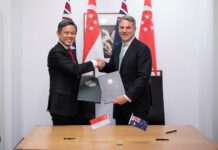
A top US defense official has signalled changes to the AUKUS agreement to make it more “sustainable” and with defense arrangements with Taiwan, Breaking Defense reports.
During confirmation hearings in Washington, John Noh, currently serving as the Deputy Assistant Secretary of Defense for East Asia, appeared before the Senate Armed Services Committee and was asked about a possible prioritization of the Western Hemisphere in the forthcoming National Defense Strategy.
Noh, who has been nominated to be the Assistant Secretary of Defense for Indo-Pacific Security Affairs, faced some skeptical lawmakers, including Chairman Sen. Roger Wicker, R-Miss., who said he was concerned in particular about the provision of arms to Taiwan. Last month The Washington Post reported that Trump canceled $400 million in military aid to Taiwan in the form of a presidential drawdown, which pulls from US stocks and has a yearly allocation of $1 billion.
“A number of us are concerned that DoD may be using the Ukraine playbook with Taiwan by taking defense items procured with Presidential Drawdown Authority and returning it to the defense stockpile.” Wicker said. “This would be contrary to Congressional intent, and would require Taiwan to purchase these items that have already been authorized as PDA.”
The GOP chairman went on to ask if it would be “good policy” to return those weapons defense stock and then require Taiwan to pay for them.
Noh said he does “strongly believe” Taiwan needs to “do its part and to pay,” while also increasing its defense spending.
“It was President Trump who said that Taiwan — which is an island that faces an existential threat from the People’s Liberation Army, from the Chinese military — that Taiwan should spend upwards to 10 percent of its GDP on defense. I strongly support that,” Noh told lawmakers.
Senators on both sides of the aisle also expressed concerns about DOD’s ongoing review of AUKUS, a decision Wicker said came as a “surprise” to Congress and “our steadfast ally, Australia.”
Noh confirmed that the review started in July and should be wrapped up this fall, and while saying he did not want to “get ahead” of Defense Secretary Pete Hegseth and Undersecretary of Defense for Policy Elbridge Colby, there could ways to alter Pillar I of the arrangement.
“There are things that I believe are common sense, things that we can do to strengthen AUKUS, to strengthen Pillar I to ensure that it is more sustainable,” Noh said.
“As the findings of the review come out, I believe Undersecretary Colby and Secretary Hegseth will have an opportunity to discuss specific recommendations as to how to strengthen Pillar I and make it more sustainable,” he later added. “But my personal view is that there are things that we — as in both the United States and Australia, with the United Kingdom — can do to strengthen Pillar I and make it more sustainable.”
AUKUS is divided into two pillars. Pillar I, currently, involves the sale of at least three US-made Virginia-class submarines to Australia followed by the creation of SSN AUKUS nuclear-powered submarines for both the UK and Australia. The prospect of the US selling the Virginia-class has prompted concern for US seapower advocates, as the US shipbuilding industrial base is already straining to keep up with the US Navy’s demand.
Pillar II revolves around co-development of new technologies among the three nations, and, potentially, other partners such as Japan, South Korea, Canada and New Zealand.



